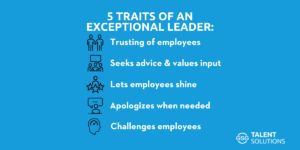5 Traits of Exceptional Leaders
Just as employees’ expectations of the workforce are changing, their idea of what makes a good leader is changing too. In years past, a person might be promoted to a leadership position because they were successful in their previous role. Perhaps they were a superior salesperson or stellar analyst. However, the skills that were needed for that job are not the same ones that are essential for effective leadership—particularly in today’s professional environment, where leaders must constantly adjust to rapid change both in the office and in their market.
As a leader, you’ll have to sift through a wealth of information to make speedy yet smart decisions and anticipate, meet, and exceed high customer and employee expectations—all while simultaneously creating a thriving, inclusive culture amongst your team. Whether you’re acting in your first leadership position (and if so, congrats!) or you’re a long-time leader, check in with yourself to make sure you’re aligning with these 5 traits of exceptional leaders:
1. They trust their employees to do the job they’ve been hired to do.
Leaders give direction and provide ongoing support throughout the project, but when it comes time, they get out of the way and trust their employees to execute the process.
2. They seek employees’ advice and value their input.
Exceptional leaders rely on the insight and advice that their employees can offer. They may not always agree, but when they ask for input, they treat it as a crucial step in their decision-making process.
3. They find opportunities to let employees shine and give credit where credit is due.
Leaders, by the very nature of their role, absorb a tremendous amount of attention. After all, they are representing the collective efforts of multiple people. However, a good leader is also proactively finding opportunities to let their people step up and gain visibility.
4. They know when and how to apologize.
Exceptional leaders know when to apologize, even for small things like tardiness or forgetting to follow up on an item. They are not afraid to own up to their mistakes and treat it as a learning opportunity.
5. They challenge employees to do bigger and better things.
Leaders are leaders because they push themselves to take risks and seek to improve their surroundings. They also encourage those that follow them to take on bigger challenges that expand their skills, and they give employees a platform to have an impact beyond the predefined scope of a role.

